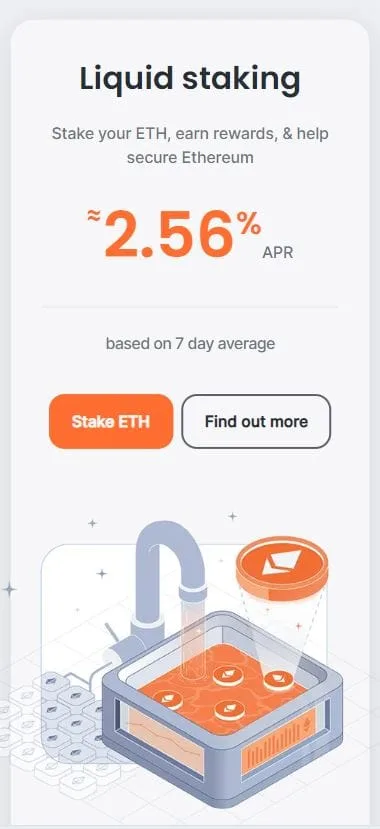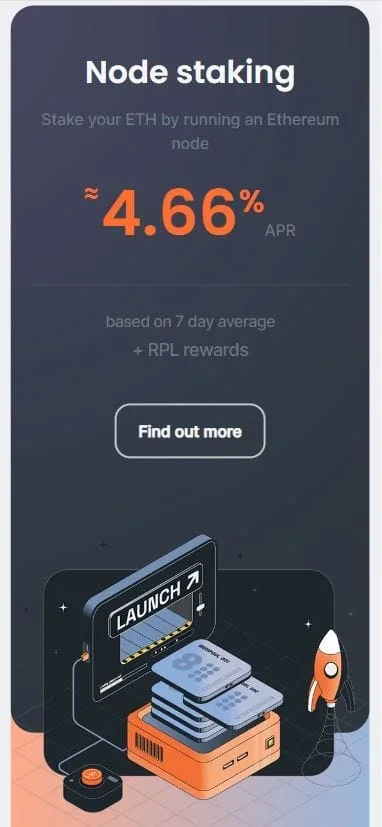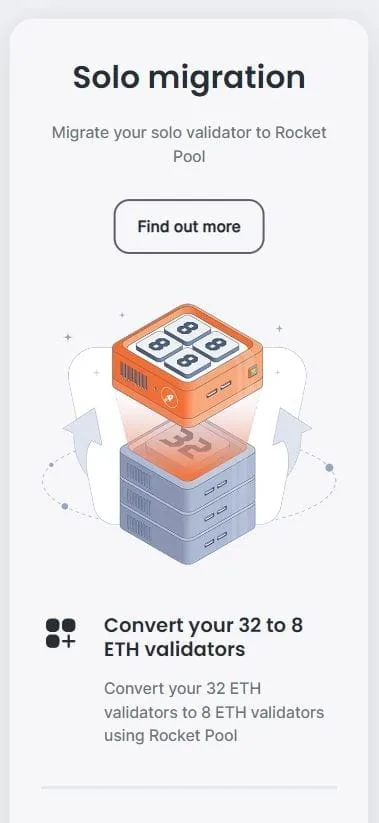About Rocket Pool (RPL)

Why Use Rocket Pool?
Rocket Pool addresses the complexities and limitations of Ethereum’s native staking process, making it more accessible and efficient for a wider range of users. Some of the key features of Rocket Pool include:
1. Stake with Less than 32 ETH
- Ethereum’s native staking requires a minimum of 32 ETH to participate, which can be a significant barrier for many users.
- Rocket Pool lowers this requirement significantly, allowing users to stake any amount starting from just 0.01 ETH. This opens up Ethereum staking to a broader audience, including those with smaller amounts of ETH.
2. No Need to Run Hardware
- To stake ETH natively on the Ethereum network, users need to run a validator node themselves. This involves significant technical expertise, hardware, and a continuous internet connection.
- Rocket Pool simplifies this by allowing users to buy and stake ETH through the platform, without needing to run a node or manage hardware. This reduces the technical barrier for participating in staking.
3. Liquidity with rETH
- When you stake ETH on Rocket Pool, you receive rETH, a token that represents your staked ETH. This token is pegged 1:1 to the value of staked ETH, but importantly, it earns staking rewards over time.
- rETH can be used just like any other ERC-20 token, meaning it can be traded, used in DeFi protocols, or held as a liquid asset while still earning staking rewards.
4. Node Operator Rewards
- Users who want to go beyond staking and contribute to Rocket Pool’s infrastructure can become node operators.
- To run a Rocket Pool node, operators must stake at least 8 ETH (instead of 32 ETH, the requirement for native staking).
- Node operators earn additional rewards for securing the network and performing the consensus duties of Ethereum, and they are rewarded with Rocket Pool’s native token (RPL) for their participation.
How Does Rocket Pool Work?
Rocket Pool is built around three core components that work together to make the staking process more accessible, decentralized, and efficient.
1. Smart Contracts
- Smart contracts are the backbone of Rocket Pool. They serve several functions:
- Accept ETH deposits from users.
- Assign staked ETH to node operators.
- Issue and track rETH (the token representing staked ETH).
- Distribute staking rewards over time to rETH holders.
- These smart contracts are decentralized and trustless, meaning they automatically manage the staking process without the need for a central authority.
2. Smart Node Network
- The Smart Node Network consists of decentralized Ethereum nodes that run Rocket Pool’s Smart Node software. These nodes help maintain the network by communicating with Rocket Pool’s smart contracts to ensure consensus and transaction verification.
- Anyone can become a node operator if they meet the 8 ETH minimum requirement. In return for operating a node, operators receive additional rewards in RPL tokens and ETH from staking rewards.
3. Minipool Validators
- Minipool Validators are smart contracts that play a critical role in the Rocket Pool network.
- A node operator deposits 8 ETH to create a minipool, and Rocket Pool users deposit additional ETH into this pool (usually 24 ETH) to reach the 32 ETH required for an Ethereum validator.
- Once the pool reaches 32 ETH, the minipool contract creates a validator on the Ethereum network and starts earning staking rewards. The rewards are then distributed to both the node operator and the stakers who contributed to the pool.
Rocket Pool Key Features
1. Lower Staking Requirements
- Unlike Ethereum’s native staking, which requires 32 ETH, Rocket Pool allows users to stake as little as 0.01 ETH. This makes Ethereum staking accessible to anyone with a small amount of ETH.
2. rETH for Liquidity
- When users stake ETH, they receive rETH, a token that is pegged to the value of staked ETH. This token can be used in other DeFi protocols or held while still earning staking rewards.
3. Node Operator Participation
- Users who have at least 8 ETH can participate as node operators, contributing to Ethereum’s security and earning additional rewards from the network. This helps decentralize the staking infrastructure and reduces reliance on large staking services.
4. Reward Distribution
- Staking rewards are distributed regularly to users who stake their ETH through Rocket Pool. The value of rETH increases over time as staking rewards are accumulated.
5. Decentralization and Security
- Rocket Pool is a decentralized platform, meaning it operates without a central authority. It uses smart contracts and decentralized node operators to ensure trustless and secure staking, aligned with Ethereum’s ethos.
Benefits of Rocket Pool
- Accessibility: Rocket Pool lowers the barriers to entry for Ethereum staking by allowing users to stake any amount of ETH (as low as 0.01 ETH).
- Liquidity: Users can retain liquidity by receiving rETH, which can be used in DeFi protocols while still earning staking rewards.
- Earning Rewards: Stakers can earn ETH rewards from Ethereum’s PoS network and RPL tokens from operating nodes.
- Decentralization: Rocket Pool helps decentralize Ethereum’s staking infrastructure, reducing centralization and ensuring a more secure network.
Risks to Consider
While Rocket Pool provides a streamlined way to stake ETH, it also comes with some risks:
- Smart Contract Risk: As with any decentralized platform, Rocket Pool is susceptible to potential bugs or vulnerabilities in its smart contracts. While the platform has undergone extensive audits, users should always be aware of the risks inherent in using decentralized finance (DeFi) platforms.
- Node Operator Risk: Node operators are responsible for the uptime and operation of their nodes. If a node operator fails to properly run a node or if their node goes offline, they may lose some of their rewards.
- Market Risk: ETH’s price can be volatile, and staking rewards are dependent on the performance of Ethereum’s PoS network. Additionally, the value of rETH may fluctuate due to market conditions.






















Anthonywax –
Crypto investment news
Anthonywax –
New cryptocurrency releases